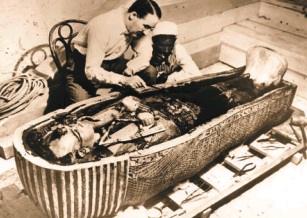There have been a number of momentous findings as a result of consistent and diligent archaeology efforts. However, certainly one of the most impressive and important of those findings is the excavation relating to the tomb of Tutankhamun due to the energetic efforts of Howard Carter, an individual who not only discovered a historical entity of great magnitude but also taught us lessons about the importance of continuing efforts to uncover the past in order to inform the present and future.
Howard Carter had an interesting background, which may have impelled him to his adult profession as an archeologist. He was born in a small town in Kensington, London, England, the son of a father who was an artist who specialized in animal paintings. Perhaps his father did influence him with this background, but the son who was later to become internationally famous found himself at the relatively young age of 17 going to Egypt, where he was hired to help record information about tombs. In 1900, he was appointed Chief Inspector of Antiquities to the Egyptian government for Upper Egypt, but a short time later, in 1904, took on another responsibility as Chief Inspector for Lower Egypt. In 1909, he became associated with the Earl of Carnarvon, who decided to finance some archeological work, and Carter was given the chance to again pursue his professional interests.  His efforts in unearthing the famous Tomb of Tutankhamun followed the beginning of his association with the Earl of Carnavon and became perhaps became the crown jewel of his professional success.
His efforts in unearthing the famous Tomb of Tutankhamun followed the beginning of his association with the Earl of Carnavon and became perhaps became the crown jewel of his professional success.
We have much for which to thank this great archeologist by the name of Howard Carter. He has contributed lasting rewards about a subject that remains of immense interest to people throughout the world. Obviously, his findings have also increased knowledge about a time that few of us know a great deal. Of course, there is also a lesson that all of us can learn from Howard Carter no matter what our intellectual pursuit may be, and it is that diligent, persistent effort often does have its rewards.
References:
- Ford, B. (1995). Searching for King Tut. New York: W. H. Freeman.
- James, T.G. H. (2001). Howard Carter: The path to Tutankhamun. Cairo: American University in Cairo Press.
- Reeves, N., & Taylor, J. H. (1993). Howard Carter: Before Tutankhamun. New York: Abrams.
- Winstone, H. V. F. (1991). Howard Carter and the discovery of the tomb of Tutankhamun. London: Constable.

